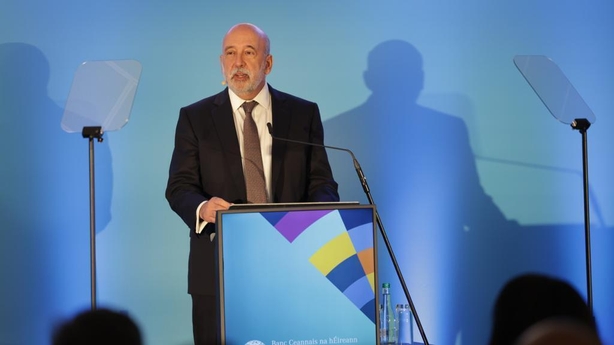Euro zone interest rates will keep falling as inflation is largely defeated and weak economic growth, potentially exacerbated by US trade tariffs, may be the next big issue on the horizon, European Central Bank policymakers said today.
The ECB has cut interest rates three times already this year and investors expect further cuts at every policy meeting until at least next June as the bloc is once again skirting recession.
Portuguese central bank chief Mario Centeno said the economy was stagnating and "risks are accumulating downwards" with tariffs threatened by incoming US President Donald Trump a further downside risk.
Centeno warned the ECB not to leave rate cuts too late because the risk of inflation undershooting the target was rising.
ECB Vice President Luis de Guindos, meanwhile, said that growth was becoming the bank's top concern and tariffs risked setting off a vicious cycle of trade wars.
"Concerns about high inflation have shifted to economic growth," he told Finnish newspaper Helsingin Sanomat.
"When you impose tariffs, you need to be prepared for the other side to retaliate, which can start a vicious circle," de Guindos said. "Eventually, this could turn into a trade war, which would be extremely detrimental to the world economy."
This could weaken growth, push up inflation and impact financial stability in a "lose-lose" situation for everyone, de Guindos said.
Trump, who has said Europe will pay a big price for having run a trade surplus with the US for years, this week pledged to impose large tariffs on his country's top three trading partners, Canada, Mexico and China, as soon as he took office.
Even if European growth suffered from higher US tariffs, the inflation impact may not be so large, France's central bank chief told a retail investor conference in Paris.
"The inflation effect could be relatively limited in Europe, however long-term interest rates set by the market have a certain tendency to cross the Atlantic," Francois Villeroy de Galhau said.
"I don't think it changes much for European short-term rates, but long-term rates could see a transition effect," he said.
Finnish central bank Governor Olli Rehn added his own warning about growth, predicting subdued activity and only a tepid recovery, which could prompt the ECB to lower its key rate to the so-called neutral level - which no longer restricts economic growth - by early spring.
While the neutral rate is not an exact number, most economists see it somewhere between 2% and 2.5%, well below the ECB's current 3.25% level.
ECB rates are unlikely to stop at the neutral rate, however, with money markets betting the deposit rate will fall to 1.75% next year, a level that would stimulate growth.
"If the U.S. imposes tariffs on other countries' products, whether they be 10% or 20%, and everyone responds, all countries lose," Rehn said.
"In this situation the US would lose the most because other countries could direct their exports elsewhere while US companies would face the same tariffs everywhere," he added.
Meanwhile, European Central Bank governing council member Gabriel Makhlouf said he wants to see euro zone services inflation fall closer to 3% from 4% currently to add to his confidence that the ECB will reach its overall inflation target next year.

"Recent data make me increasingly confident of reaching our 2% inflation target during 2025, but the stickiness of services inflation and elevated wage growth leave some room for caution," Makhlouf said in the text of a speech to be delivered in London yesterday.
"With goods inflation around its long-term average of 0.5-1%, I want to see services inflation closer to 3% in order to be more in-line with our target," he said.
Mr Makhlouf, the Central Bank Governor, reiterated that he remains open-minded on the pace of future interest rate cuts given recent volatile economic data and uncertainty regarding economic policy in trade partners.

